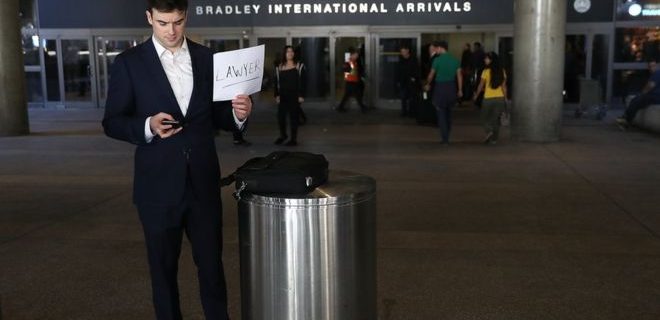Is Trump’s immigration order legal?

Senate Majority Leader Mitch McConnell may have offered the most prescient reaction to President Donald Trump’s executive order suspending refugee resettlement and blocking individuals from seven majority-Muslim nations from entering the United States.
“It’s going to be decided in the courts as to whether or not this has gone too far,” he said.
To make matters worse for Mr Trump, he has had difficulties with his own Justice Department.
He fired acting US Attorney General Sally Yatesafter she questioned the legality of the immigration ban. Ms Yates was replaced by Dana Boente, US attorney for the Eastern District of Virginia, who has directed the department to enforce Mr Trump’s order.
Even with government lawyers on his side, Mr Trump’s presidential authority on immigration issues is broad, but it’s not without limitations – and those limitations are interpreted and enforced by the US judicial system. In the case of Mr Trump’s immigration action, that’s already happening.
In the days after Mr Trump signed the executive order, federal judges in four states granted the ACLU’s request for temporary injunctions prohibiting individuals who were detained at US airports from being sent back to their countries of origin.
“The petitioners have a strong likelihood of success in establishing that the removal of the petitioner and others similarly situated violates their rights to Due Process and Equal Protection guaranteed by the United States Constitution,” New York federal judge Ann Donnelly writes in her court decision.
Although the rulings were heralded as a victory for Mr Trump’s opponents, they are temporary in nature and of narrow scope. The major frontal assaults on the order are only just now being launched.
On Monday afternoon, the state of Washington announced its challenge – backed by tech companies Amazon and Expedia.
“At the end of the day, either you’re abiding by the Constitution or you are not,” Washington Attorney General Bob Ferguson said. “And in our view, the president is not adhering to the Constitution when it comes to this executive action.”
The Council on American-Islamic Relations (CAIR) has also filed a legal case against what it terms the “Muslim Exclusion Order” on behalf of a group of Muslim-Americans and unnamed citizens of nations covered by the ban currently residing in the US.
The ACLU, fresh off its injunction success, is also gunning to take down the entire order.
Here are some of the ways they’re building their cases.
The Constitution
CAIR and others argue that by implicitly singling out those of the Muslim faith, Mr Trump’s order amounts to an establishment of a state religion, in violation of the First Amendment of the Constitution. (“Congress shall make no law respecting an establishment of religion.”).
They cite comments by Mr Trump on the campaign trail, and his political surrogates, along with the exemption that the immigration order provides for religious minorities as evidence of discriminatory intent – even though the order did not mention Muslims or Christians by name.
Although Mr Trump backed away from his pledge to ban US entry to all Muslims, writes the ACLU’s David Cole, he “never gave up his focus on the religion of Islam. Friday’s executive orders are of a piece with his many anti-Muslim campaign promises.”
Mr Trump’s challengers also argue the action violates the Fifth and Fourteenth Amendment guarantees of “due process of the law” by denying entry to individuals who have valid visas.
“The very concept of due process emerged from a desire to limit the king’s ability to order unlawful arrests,” writes Mark Joseph Stern in Slate. “It appears we are returning to the days when the head of state can detain purported threats without a whiff of evidence that they have broken a law.”
Source: BBC





























